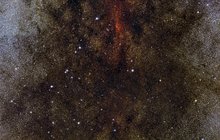Visible and Infrared Survey Telescope for Astronomy
VISTA ― the Visible and Infrared Survey Telescope for Astronomy ― is part of ESO’s Paranal Observatory. VISTA works at near-infrared wavelengths and is the world’s largest survey telescope. Its large mirror, wide field of view and very sensitive detectors are revealing a completely new view of the southern sky.
The telescope is housed on the peak adjacent to the one hosting the ESO Very Large Telescope (VLT) and shares the same exceptional observing conditions.
VISTA has a main mirror that is 4.1 metres across. In photographic terms it can be thought of as a 67 megapixel digital camera with a 13 000 mm f/3.25 mirror lens.
At the heart of the telescope is a huge three-tonne camera with 16 state-of-the-art infrared-sensitive detectors.
Science with VISTA
 VISTA’s observing time is devoted to mapping the sky systematically and six huge public surveys are taking up the majority of the telescope’s operation time. Some are studying small patches of sky for long periods to detect extremely faint objects and others are surveying the entire southern sky. The observations are creating vast new data collections that will support research in many astronomical projects ranging from studies of small bodies in our own Solar System out to cosmological investigations of the nature of dark matter and dark energy. Within our galaxy, VISTA is discovering many new objects and testing ideas about the nature of dark matter. Using VISTA data, astronomers will be able to create a three-dimensional map of about 5% of the entire observable Universe. Further out, VISTA is a powerful tool for discovering remote quasars and studying the evolution of galaxies and clusters of galaxies. It is probing the nature of dark energy by finding very distant galaxy clusters.
VISTA’s observing time is devoted to mapping the sky systematically and six huge public surveys are taking up the majority of the telescope’s operation time. Some are studying small patches of sky for long periods to detect extremely faint objects and others are surveying the entire southern sky. The observations are creating vast new data collections that will support research in many astronomical projects ranging from studies of small bodies in our own Solar System out to cosmological investigations of the nature of dark matter and dark energy. Within our galaxy, VISTA is discovering many new objects and testing ideas about the nature of dark matter. Using VISTA data, astronomers will be able to create a three-dimensional map of about 5% of the entire observable Universe. Further out, VISTA is a powerful tool for discovering remote quasars and studying the evolution of galaxies and clusters of galaxies. It is probing the nature of dark energy by finding very distant galaxy clusters.
VISTA was conceived and developed by a consortium of 18 universities in the United Kingdom, led by Queen Mary, University of London and became an in-kind contribution to ESO as part of the UK's accession agreement. Project management for the telescope design and construction was undertaken by the Science and Technology Facilities Council‘s UK Astronomy Technology Centre (STFC, UK ATC).
The telescope was provisionally accepted by ESO on 10 December 2009 and is now operated by ESO.
Science goals
Devoted to surveys. Variable stars, deep surveys, brown dwarfs, etc.
More about VISTA
- The VISTA mirror
- The VISTA camera
- The VISTA surveys
- The VISTA consortium
- For Scientists: Details for observers using VISTA are available at: Paranal Instrumentation page
VISTA
|
|
|
